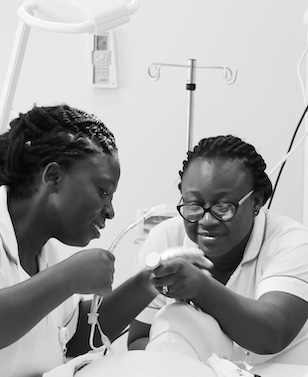| News
Researchers discover new autoinflammatory condition
A team of specialists from Australia and the United States has identified a new autoinflammatory condition in humans. They also understand what causes it, which can help researchers find adequate treatment.

A team of specialists from Australia and the United States has identified a new autoinflammatory condition in humans. They also understand what causes it, which can help researchers find adequate treatment.
Autoimmune conditions occur when the body's immune response becomes abnormally activated. When this happens, it turns against healthy cells instead of just reacting to potentially harmful agents, such as viruses or dangerous bacteria, as it should.
Recurrent fevers with unclear causes and widespread inflammation characterize such conditions.
While they are not widespread, doctors often find autoinflammatory conditions challenging to diagnose. This is problematic, as these conditions can severely impact a person's well-being and quality of life.
So far, researchers have identified only a handful of autoinflammatory conditions. They include familial Mediterranean fever, cryopyrin-associated periodic fever syndrome, Still's disease, and periodic fever, aphthous stomatitis, pharyngitis, and adenitis syndrome (PFAPA).
Recently, however, a team of experts from the University of Melbourne in Australia and the National Institutes of Health (NIH) in Bethesda, MD, has discovered another autoinflammatory condition.
The researchers have named it "cleavage-resistant RIPK1-induced autoinflammatory (CRIA) syndrome." They explain how they discovered it and what they think might be the path towards a treatment in a study paper in the journal Nature.
A 'remarkable' finding
The researchers' interest was piqued when members of three different families sought treatment for a mysterious autoinflammatory disorder whose main characteristics were states of fever and swelling of the lymph nodes.
These individuals reported that they first experienced the symptoms in childhood, though they had persisted through adulthood.
To try and find out what caused this unknown autoinflammatory condition, the researchers looked to the individuals' DNA. The investigators found the condition's root cause when they analyzed the exomes in DNA samples from the people who had CRIA syndrome. The exome is part of a person's genetic material that encodes proteins.
MEDICAL NEWS TODAY NEWSLETTER
Stay in the know. Get our free daily newsletter
Expect in-depth, science-backed toplines of our best stories every day. Tap in and keep your curiosity satisfied.
Enter your email
Your privacy is important to us
By looking at the samples, the researchers made the intriguing discovery that all the people who had CRIA syndrome had a mutant RIPK1 gene.
This gene encodes the specialized protein (enzyme) of the same name, which plays a crucial role in regulating programmed cell death (necroptosis).
"Cell death pathways have developed a series of inbuilt mechanisms that regulate inflammatory signals and cell death because the alternative is so potentially hazardous," explains Dr. Najoua Lalaoui, one of the lead researchers involved in this study.
"However, in this disease, the mutation in RIPK1 is overcoming all the normal checks and balances that exist, resulting in uncontrolled cell death and inflammation," she points out.
The finding provided the key to understanding how the newly discovered autoinflammatory condition unfolded, emphasizes another one of the lead authors, Dr. Steven Boyden.
"We sequenced the entire exome of each patient and discovered unique mutations in the exact same amino acid of RIPK1 in each of the three families. It is remarkable, like lightning striking three times in the same place. Each of the three mutations has the same result — it blocks cleavage of RIPK1 — which shows how important RIPK1 cleavage is in maintaining the normal function of the cell."
Dr. Steven Boyden
On track for finding a treatment?
Although the condition is a newcomer on the clinical stage and has no apparent treatment, the specialists who discovered it argue that the answer to CRIA syndrome most likely lies in the cause that drives it.
"Understanding the molecular mechanism by which CRIA syndrome causes inflammation affords an opportunity to get right to the root of the problem," notes co-lead author Dr. Dan Kastner, who is one of the leading specialists in inflammatory conditions.
Dr. Kastner explains that he and his colleagues have already started looking for possible ways of treating this condition. In fact, they have already treated some people with CRIA syndrome with anti-inflammatory drugs, such as high dosage corticosteroids and biologics.
While some people demonstrated significant improvement following their treatment, others did not improve or experienced side effects.
But the researchers remain confident that they will find an appropriate therapy for everyone affected by the newly discovered condition.
"RIPK1 inhibitors may be just what the doctor ordered for these patients," says Dr. Kastner. "The discovery of CRIA syndrome also suggests a possible role for RIPK1 in a broad spectrum of human illnesses, such as colitis, arthritis, and psoriasis."
And there is further good news — RIPK1 inhibitors are already available to researchers, so ongoing tests may be able to further refine and perfect treatments on a case by case basis.
Autoimmune conditions occur when the body's immune response becomes abnormally activated. When this happens, it turns against healthy cells instead of just reacting to potentially harmful agents, such as viruses or dangerous bacteria, as it should.
Recurrent fevers with unclear causes and widespread inflammation characterize such conditions.
While they are not widespread, doctors often find autoinflammatory conditions challenging to diagnose. This is problematic, as these conditions can severely impact a person's well-being and quality of life.
So far, researchers have identified only a handful of autoinflammatory conditions. They include familial Mediterranean fever, cryopyrin-associated periodic fever syndrome, Still's disease, and periodic fever, aphthous stomatitis, pharyngitis, and adenitis syndrome (PFAPA).
Recently, however, a team of experts from the University of Melbourne in Australia and the National Institutes of Health (NIH) in Bethesda, MD, has discovered another autoinflammatory condition.
The researchers have named it "cleavage-resistant RIPK1-induced autoinflammatory (CRIA) syndrome." They explain how they discovered it and what they think might be the path towards a treatment in a study paper in the journal Nature.
A 'remarkable' finding
The researchers' interest was piqued when members of three different families sought treatment for a mysterious autoinflammatory disorder whose main characteristics were states of fever and swelling of the lymph nodes.
These individuals reported that they first experienced the symptoms in childhood, though they had persisted through adulthood.
To try and find out what caused this unknown autoinflammatory condition, the researchers looked to the individuals' DNA. The investigators found the condition's root cause when they analyzed the exomes in DNA samples from the people who had CRIA syndrome. The exome is part of a person's genetic material that encodes proteins.
MEDICAL NEWS TODAY NEWSLETTER
Stay in the know. Get our free daily newsletter
Expect in-depth, science-backed toplines of our best stories every day. Tap in and keep your curiosity satisfied.
Enter your email
Your privacy is important to us
By looking at the samples, the researchers made the intriguing discovery that all the people who had CRIA syndrome had a mutant RIPK1 gene.
This gene encodes the specialized protein (enzyme) of the same name, which plays a crucial role in regulating programmed cell death (necroptosis).
"Cell death pathways have developed a series of inbuilt mechanisms that regulate inflammatory signals and cell death because the alternative is so potentially hazardous," explains Dr. Najoua Lalaoui, one of the lead researchers involved in this study.
"However, in this disease, the mutation in RIPK1 is overcoming all the normal checks and balances that exist, resulting in uncontrolled cell death and inflammation," she points out.
The finding provided the key to understanding how the newly discovered autoinflammatory condition unfolded, emphasizes another one of the lead authors, Dr. Steven Boyden.
"We sequenced the entire exome of each patient and discovered unique mutations in the exact same amino acid of RIPK1 in each of the three families. It is remarkable, like lightning striking three times in the same place. Each of the three mutations has the same result — it blocks cleavage of RIPK1 — which shows how important RIPK1 cleavage is in maintaining the normal function of the cell."
Dr. Steven Boyden
On track for finding a treatment?
Although the condition is a newcomer on the clinical stage and has no apparent treatment, the specialists who discovered it argue that the answer to CRIA syndrome most likely lies in the cause that drives it.
"Understanding the molecular mechanism by which CRIA syndrome causes inflammation affords an opportunity to get right to the root of the problem," notes co-lead author Dr. Dan Kastner, who is one of the leading specialists in inflammatory conditions.
Dr. Kastner explains that he and his colleagues have already started looking for possible ways of treating this condition. In fact, they have already treated some people with CRIA syndrome with anti-inflammatory drugs, such as high dosage corticosteroids and biologics.
While some people demonstrated significant improvement following their treatment, others did not improve or experienced side effects.
But the researchers remain confident that they will find an appropriate therapy for everyone affected by the newly discovered condition.
"RIPK1 inhibitors may be just what the doctor ordered for these patients," says Dr. Kastner. "The discovery of CRIA syndrome also suggests a possible role for RIPK1 in a broad spectrum of human illnesses, such as colitis, arthritis, and psoriasis."
And there is further good news — RIPK1 inhibitors are already available to researchers, so ongoing tests may be able to further refine and perfect treatments on a case by case basis.


